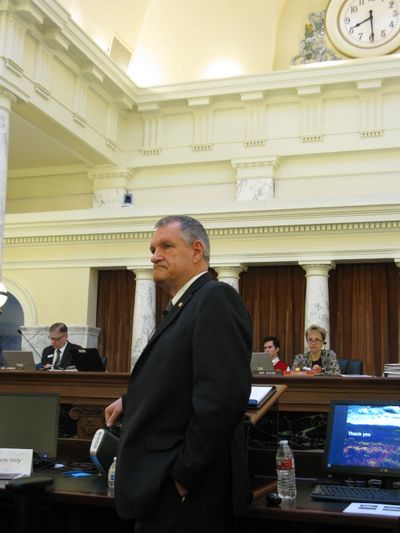Tippets: Idaho must charge fees if it wants to keep primacy from feds over underground tank program

Idaho received primacy from the federal government to regulate underground storage tanks in 2012, state DEQ Director John Tippets told the Joint Finance-Appropriations Committee this morning, but it doesn’t have sufficient funds to operate the program. “Idaho is currently one of only two states that does not assess fees to support the program,” Tippets, a former state senator who was named to head the department seven months ago, told lawmakers.
So he is proposing legislation this year to allow fees of up to $100 per tank. Idaho has 3,350 underground storage tanks statewide. “Every year we need to inspect in the neighborhood of 1,100 tanks, so that’s a lot of on-the-ground work,” Tippets said. DEQ is requesting – and Gov. Butch Otter is recommending – a stopgap appropriation of $160,000 in state general funds for the next two years to keep the program going until fees can kick in and cover its costs.
“We’ve been creatively pulling together enough funding for the past few years to keep the program going,” Tippets said. “Our approach is not sustainable for the long term.” He said the underground storage tank inspection and permitting program is “now at a bare bones funding level,” and without a long-term funding source, the state won’t be able to retain primacy – which means federal authorities would take the program over.
“I personally believe that there are clear benefits to having the Idaho Department of Environmental Quality implement environmental programs in Idaho rather than the federal government,” Tippets told lawmakers. He cited increased flexibility, improved customer service, “ability for Idahoans to interface with other Idahoans to resolve issues related to the environment,” increased opportunities for public participation, “often lower penalties associated with enforcement actions,” and shorter timelines.
“We currently have a prohibition in statute against collecting fees to support the program,” Tippets said. “The fee, if the legislation passes, will go through a rulemaking process.” Under the legislation, fees would be capped at $100 per tank; Tippets said most tank owners have an average of about three tanks.
Overall, Otter is recommending a 10.1 percent increase in state general funds for DEQ next year, and 4.2 percent overall. Much of the general-fund increase is for employee compensation and benefit costs, covering the once-every-11-years 27 th payroll period, and one-time expenses to replace various equipment. But it also includes $464,200 and four new positions for the Idaho Pollutant Discharge Elimination System, the multi-year phase-in the Legislature approved in 2014 to have Idaho take primacy over permitting in the National Pollutant Discharge Elimination System, or NPDES.
Idaho is “on track,” Tippets said. At full buildout, the program will need 29 full-time employees and cost about $3.1 million a year to run, Tippets said, with the funds “a combination of general funds, fees and a small amount of federal dollars.” He said, “We currently have six positions already. We’re asking you for four more, to bring us to a total of 10. We’ll be back in subsequent years looking for the other ones as we need them.”
Idaho is one of four states that do not have primacy to issue the NPDES permits. The state’s application to the EPA is due Sept. 1, at which point it must demonstrate its ability to fully implement the program. Sen. Dan Schmidt, D-Moscow, asked whether the current ramp-up of the program is sufficient to meet that deadline, and Tippets said yes. “We’re bringing on the employees as we need them,” he said.
Tippets told budget writers that part of DEQ’s mission is “a service perspective.” He said, “We have enforcement authority, and it’s important that we do, and sometimes we have to use it, but that’s not where we want to start. We want to help people, first of all, understand the law. … Where appropriate, we want to help them comply with the law.” And, he said, “if that doesn’t work … sometimes we have to go into enforcement mode.”
* This story was originally published as a post from the blog "Eye On Boise." Read all stories from this blog